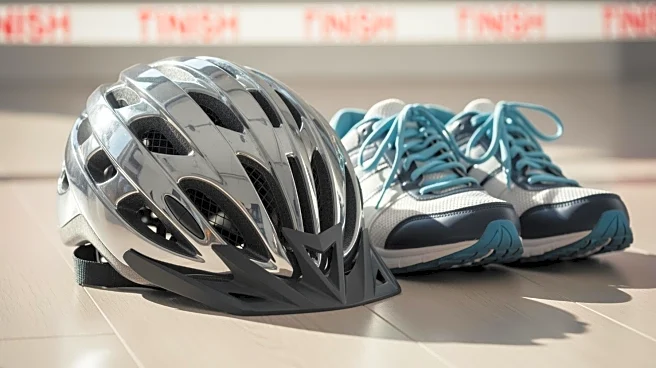What's Happening?
Natalie Grabow, an 80-year-old grandmother from Mountain Lakes, New Jersey, has become the oldest woman to complete the Ironman World Championship in Kailua-Kona, Hawaii. Grabow, who learned to swim at age
59, finished the grueling triathlon, which includes a 2.4-mile swim, a 112-mile bike ride, and a 26.2-mile run, in 16 hours, 45 minutes, and 26 seconds. Her achievement was celebrated with cheers and chants from the crowd as she crossed the finish line. Grabow was the sole entrant in the 80-84 age group and was supported by her daughter and coach during the event. Her accomplishment marks a significant milestone in her 20-year journey in triathlon competitions.
Why It's Important?
Grabow's achievement is a testament to the possibilities of athletic pursuits at any age, challenging stereotypes about aging and physical capability. Her success may inspire older individuals to engage in sports and physical activities, promoting health and wellness across age groups. Additionally, her story highlights the growing inclusivity in sports, encouraging participation from diverse age demographics. Grabow's journey also underscores the importance of perseverance and dedication, serving as a motivational example for aspiring athletes and those considering new challenges later in life.
What's Next?
Following her record-setting performance, Grabow plans to continue her participation in triathlons. She has already registered for two half Ironman races in 2026, indicating her ongoing commitment to the sport. Her future endeavors may further inspire others to pursue athletic goals regardless of age, potentially influencing sports organizations to create more opportunities for older athletes. Grabow's continued involvement in triathlons could also lead to increased media attention and support for senior athletes, fostering a more inclusive sporting environment.
Beyond the Headlines
Grabow's story highlights broader societal shifts towards recognizing the capabilities of older adults in competitive sports. It raises questions about ageism and the barriers that older individuals face in accessing athletic opportunities. Her success may contribute to changing perceptions and policies regarding age and sports participation, encouraging more inclusive practices. Additionally, her journey reflects the importance of cross-training and injury prevention, offering insights into effective training methods for athletes of all ages.










